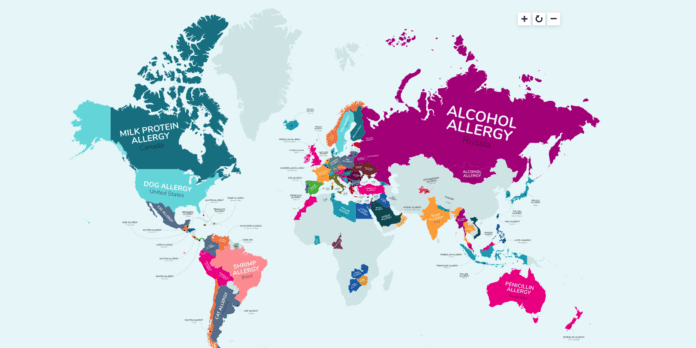- Pollen and spring allergies are the most searched for around the world, followed by penicillin and cat allergies
- 45% of the most searched for allergies were food-related – Gluten coming out on top
- Medicine allergies are the second most Googled globally, as well as coming out as the most searched for allergy in the UK
- Cat allergies is the third most Googled globally, yet dog allergies come out on top in the US at 33,100 searches per month
July 2022: A new study from Chemist4U has revealed what the most Googled allergy is in each country. View the interactive map here: https://www.chemist-4-u.com/content/allergies-hayfever/most-searched-for-allergy-each-country/
Becoming allergic to something can happen at any stage in your life. If you are someone who starts to experience allergy symptoms, such as itchy eyes, runny nose and a rash, for the first time, you might be wondering what is happening? The uncertainty often sends people to “Doctor Google” to search for more information about what might be causing their discomfort.
By translating the word ‘allergy’ into every language and then analysing Google search data, Chemist4U reveals the countries’ most commonly searched allergy.
The top allergy in the United States is a dog allergy with just over 33,000 searches per month. In a nation where 56% of people own at least one dog, dealing with this allergy must be a daunting prospect for dog lovers.
The UK’s most commonly searched for allergy is a penicillin allergy, with Brits making on average 8,100 searches a month. According to the NHS website, around one in 15 people have an allergic reaction to antibiotics, especially penicillin, and if this is the case, another antibiotic will be administered.
The top five most Googled allergies across the globe
| Rank | Allergy | Countries with most Googled allergy |
| 1 | Pollen/Spring allergy | 15 |
| 2 | Penicillin allergy | 13 |
| 3 | Cat allergy | 9 |
| =4 | Gluten allergy | 7 |
| =4 | Latex allergy | 7 |
| 5 | Dust/Dust mite allergy | 5 |
The most Googled allergy across the world is a pollen allergy, or as it’s known in some parts of the world, a “spring allergy”. A total of 15 out of the 95 countries studied typed these phrases into Google the most. Both of these allergies are better known as hay fever, the seasonal allergy that is triggered by the release of pollen.
The allergy that resulted in the second most searches in total is a penicillin allergy. Penicillins are a group of antibiotics that fight bacteria and were originally developed from the Penicillium fungi. It is one of the most widely used antibiotics to treat infections.
The third most searched for allergy in total is an allergy to cats. Cat allergies are the most common animal-origin allergy and affect approximately one in five adults worldwide. Due to the pandemic and modern lifestyles, such as working from home, more and more people are spending time indoors, therefore pet allergy is the second most common indoor allergy (second to house dust mites).
The most Googled allergy groups worldwide
| Rank | Allergy group | % of top most searched for allergies globally | Most searched for allergy in allergy group |
| 1 | Food | 45% | Gluten allergy |
| 2 | Medicine | 17% | Penicillin allergy |
| =3 | Products | 14% | Latex allergy |
| =3 | Environment | 14% | Pollen/Spring allergy |
| 4 | Animals | 10% | Cat allergy |
James O’Loan, Pharmacist and CEO at Chemist4U comments:
“Allergies can be a frustrating part of day-to-day life for many people across the globe. They can impact anyone and can be developed at any point in our lives, leading many people to turn to ‘Doctor Google’ to learn more about why they’re suffering the symptoms they’re experiencing.
“Interestingly, the most popular allergy across the globe is a pollen allergy – or, more widely known, as hay fever. Luckily, this allergy is seasonal and very treatable. Some of the other top allergies may require a change in lifestyle to avoid contact – such as with cat allergies – or using alternative products, such as gluten, penicillin or latex allergies. For some sufferers, having an allergy can be a nuisance and affect their everyday activities, but most allergies are mild and can be largely kept under control.
“Although Google can be a great source of information and, arguably, the first port of call to self-diagnose, it’s always important to check with your pharmacist or GP if you suspect you or your child might be having an allergic reaction.”

| [donate]
| Help keep news FREE for our readersSupporting your local community newspaper/online news outlet is crucial now more than ever. If you believe in independent journalism,then consider making a valuable contribution by making a one-time or monthly donation. We operate in rural areas where providing unbiased news can be challenging. |



















